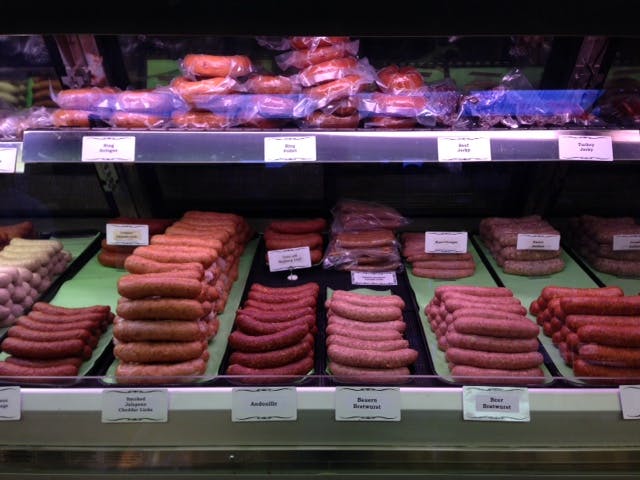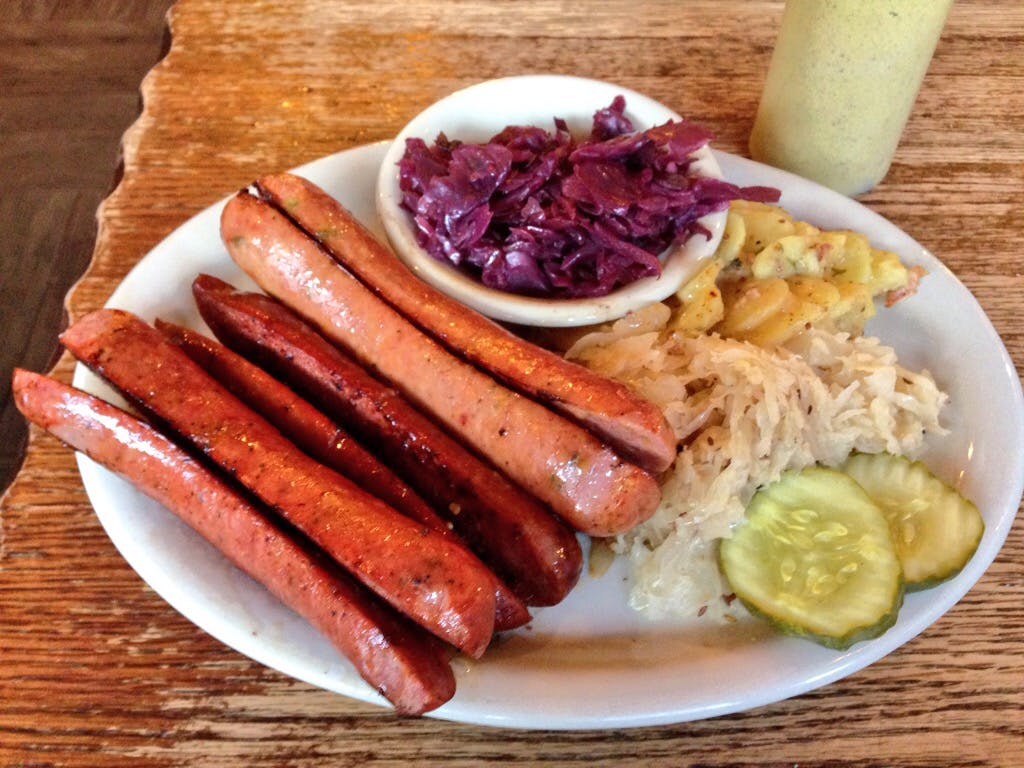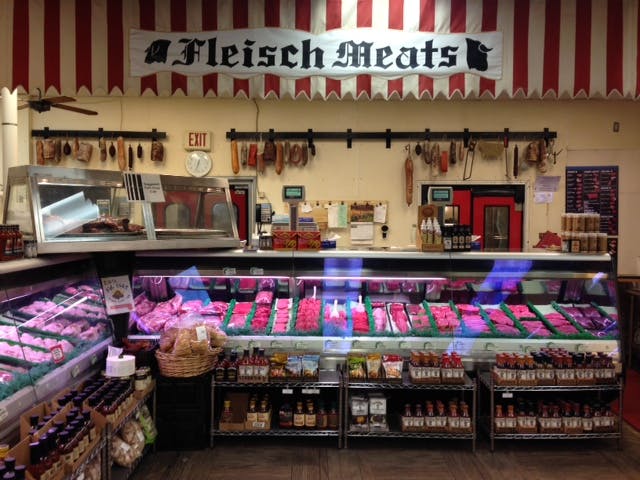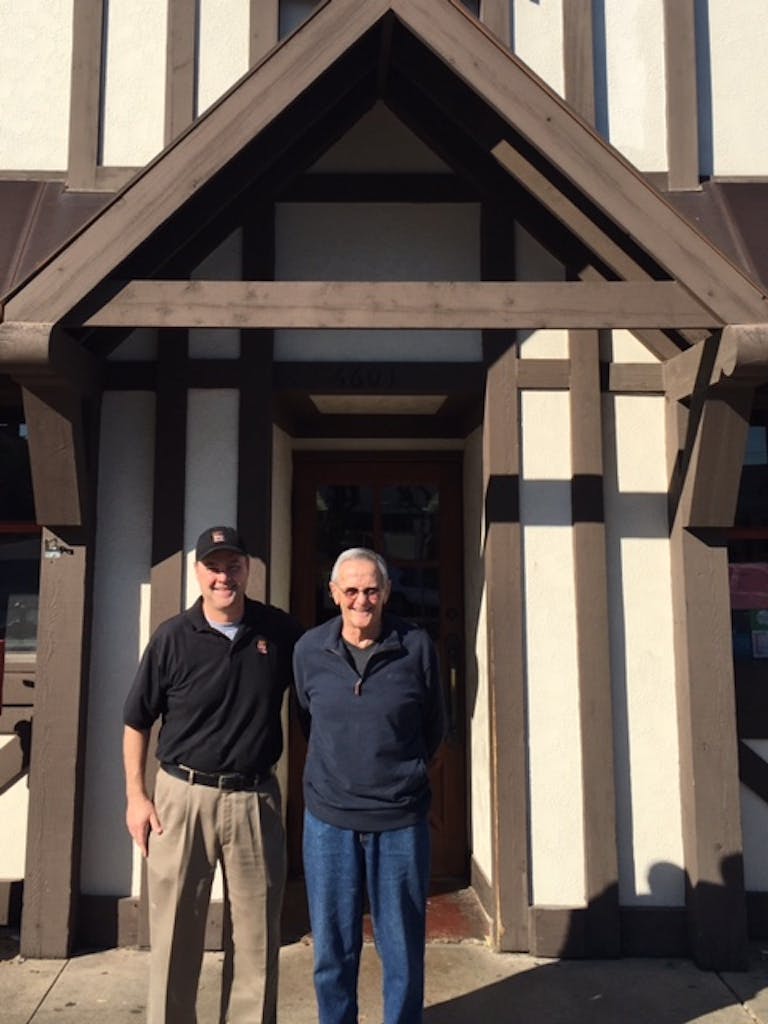
Owner: Kuby’s Sausage House; Opened 1961
Age: 84
If you’ve had breakfast at Kuby’s Sausage House in Dallas’s Snider Plaza, chances are you’ve seen Karl Kuby Sr. canvassing the dining room looking for kids so he can pass out his trove of gummy bears. At eighty-four he’s still there often, or down at the family’s meat processing facility on the other side of town. He opened Kuby’s in 1961, and now it’s a Dallas landmark, but it wasn’t an easy journey.
A native of Kaiserslautern, Germany, Karl came to the Texas because he didn’t have much of a future in the family business. He emigrated to the Lower Rio Grande Valley, and eventually made his way to Dallas where he opened his own sausage shop in the present day location. His son, Karl Jr. now runs the operation making him the fourteenth generation of Kubys, in a row, to run a meat market.
I sat down with Karl Sr. at both the processing facility, and again in his office at the restaurant. He told stories about a couple buffalo he barbecued for the Super Bowl (find that story here), and about a huge beef barbecue in the Lower Rio Grande Valley. He also provided a detailed account of his family’s history in meat.
Daniel Kuby was the forefather of Karl Kuby Sr. He lived in Germany before there was Germany and the country was broken into independent kingdoms. Daniel Kuby was an attorney and managed one of the kingdoms. When the king died and the prince took over they got into a disagreement about taxation. Kuby held his ground, but his position as manager was stripped from him, so he left for Kaiserslautern, Germany (Karl Kuby Sr.’s hometown) in 1713. That’s where we pick up the story.
Karl Kuby: [Daniel Kuby] came to Kaiserslautern and there the emperor had a castle but it was kind of like a hunting castle because it was a beautiful place. So he talked to the emperor and they wouldn’t hire him. He was in a little town and he met this lady, her husband had died and she had a butcher shop there. The family had already owned it for 100 years. He married her and took over the shop. The butcher’s guild said, “You can’t do that. You have to have a master’s degree in the meat business.” So he had to serve an apprenticeship, which was three years, then be a journeyman for five years, then he could get his master. He came in 1713, so by the time he took over it was 1723.
DV: How old was he at that point?
KK: Maybe 40. He lived until he was 56 years old. He took over and then he became a rabble-rouser. The king would tell them how much they could sell the lamb and how much they could sell the beef, the pork, the sausages, they would tell them the prices. And he says, “We’re not going to do that.” He became the head master of the guild. He was outspoken and he dictated the prices so they could make money. He was not too popular but he established that the people could control whatever they sell.
DV: He went from being a lawyer to owning a butcher shop, having to go through the whole program, and then becoming the head of the butcher’s guild?
KK: Yeah. He ran the butcher’s guild for that area. Maybe 30-40 butchers. They elect the head master, they call them the guild master. And he was that for a number of years until he died.
DV: Is that the butcher shop in the old photo?
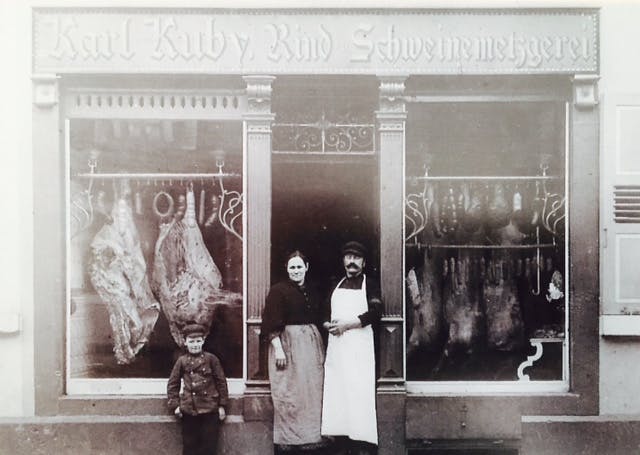
KK: Not the original one. The original one was bombed in ’44. It was wiped out. But let me go back to my great grandfather. My great grandfather, Phillip Kuby, he was the head butcher. He was a real sharp guy. He was the head of the guild. He had four boys and three girls. When he died, he left each one ten thousand gold marks. The girls got their dowry and a house. The first three boys, each one got a butcher shop. And the fourth boy got a butcher supply shop. Each one got the same amount of money. The boys didn’t think it was enough, and they got together and told their father. The story goes that he said, “If you can’t make it with what I left you, you don’t deserve any of it.” He was a tough cookie. But anyway, why I am here is this – my grandfather was Karl Kuby. He was second oldest of the boys, and he had a butcher shop that was in my family until 1990 or 1995, something like that. I had two brothers and a sister. The oldest brother got the business but I didn’t get any because my wife was not the right kind of wife to run the business. She was a seamstress and a model. She was not a businesswoman. My little brother was a very good cook and a very good sausage maker. He had the golden tongue so to speak, but he was not a business man. My other brother had a degree, so he ran the business side of it and my little brother made the sausages and he became the head of the guild.
DV: The same guild that Daniel Kuby had begun in?
KK: Yes, the same, but he became the head of the guild for the whole state. But, he had to quit, so they closed the business up. He had two sons, but one of them died, and the other is a business manager so he didn’t want to fool around with the meat business.
DV: Where is Kaiserslautern in Germany?
KK: It’s between Luxembourg and Strasburg.
DV: Right on the border?
KK: Yeah we were fifteen miles from the border. Our country was fifty years French then sixty years German, and vice versa. People all basically understood French and German. After 1870, it was given back to the Germans because we conquered it. There was a war between Bavaria and Prussia and France. The Bavarians would help the Prussians only if they would give our part of the country. So they gave our part to the Bavarians, and we had to speak German again. Well, under Napoleon we were taken away from the Germans to the French.
DV: The butcher shop went from being a German butcher shop to a French one?
KK: Charcuterie [laughing], that’s right.
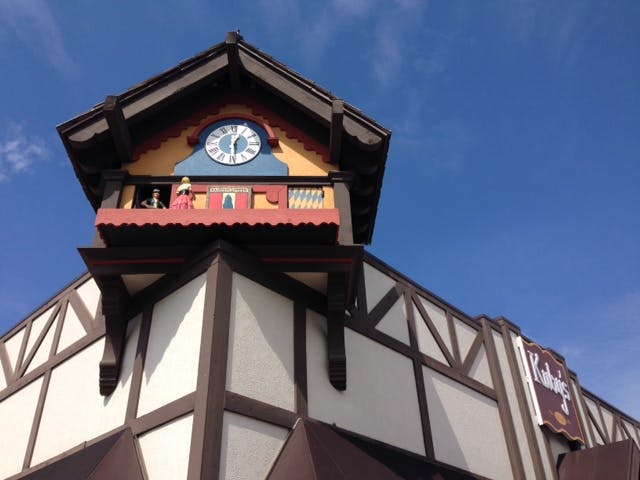
DV: Did you ever consider going back to keep it open?
KK: No. I’m here, there’s a big business here.
DV: That’s gotta be tough to see, but I guess you are here carrying on the family business.
KK: Well, I turned it over to my son, but I’m still around. They accept my leadership, but they’re doing things their way.
DV: What are the things that they do their way that you would have never done? Is it recipes or processes?
KK: No, they stuck pretty much to my recipes.
DV: It has to be nice to see the fact that you are able to pass on the business to another generation to keep it going.
KK: Yeah that’s right. My oldest son, he was in the business. He died. Karl was at SMU studying business administration.
DV: Karl said he didn’t like college all that well.
KK: Yes. I had a flood. I had warehouse downtown for my food processing on Ross and Central Expressway. Christmas was falling on a Monday so we were closed Sunday and Monday. A cold front was reported and we had the sprinkler system. When it would get really cold in the old days they didn’t have the parts insulated so you had to drain them when it was going to be cold. My manager down there forgot. On Monday night somebody called me from the neighbors down there. He said, “Karl you know you have water coming out of your building?” I said, “What do you mean water?” He said, “There’s a flood of water coming out of your warehouse and your offices.” I went down there. When I opened the door…Whoosh! The water was 4 feet high. Everything was underwater. Karl was at SMU, but he said, “Let me work for you a little while.” I straightened out all the papers, and he worked on that for while. Then, he said, “Can I work for you?” I said, “Why don’t you study medicine? That’s what I did and I never finished.” But anyways, that’s how it ended up.
DV: Well he told me a story about when he was on break. He was out late one night and came home late and was still living with you and he hadn’t found a job yet. And then you came in and woke him up at 3:00 in the morning and you said, “Get up, you’re coming to help me.”
KK: Yeah, I was desperate.
DV: Was this that night?
KK: Yeah. You can imagine…no electricity, nothing. Anyway, Karl got a degree in business he’s sharp. I was more kind of…
DV: You led by example?
KK: …My middle name is “Work.”
DV: What was your father’s name?
KK: My father was Friedrich. My grandfather was Karl Friedrich. Then his son is Friedrich Karl and then I’m Karl Friedrich again.
DV: And your son is Karl Junior.
KK: Yeah my son is Karl Junior. He’s Karl Friedrich the second and then his son is Karl Friedrich the third. They call him Trey.
DV: I presume your father was also in the meat business.
KK: My father ran the business and my grandfather was in WWI and he got some kind of disease in the war, but he worked. Kuby’s was known for game processing in Germany. They would process 60,000 hares, like jackrabbits. The German hares were about 8-15 pounds. We would ship them to hotels all over Europe. After WWII they ran about 60,000 sheep for the French army. Their main meat they ate was mutton.
DV: For the market itself, you processed a lot of beef and pork, right?
KK: We had beef and pork. When you look at the picture, you see beef is on the one side and pork on the other. It was kind of separated.
DV: What was it like growing up in a butcher shop? Is that where you spent a lot of time as a child?
KK: Yeah, we helped out. We helped cleaning out. We helped cooking the sausage. We had to carry it around and go to the kill floor and kill the cattle and all that kind of stuff. I served two years as an apprentice, then I served another two years as a journeyman. Then, because I went to America and I had already a high school diploma and a year of college, they let me take a Masters examination. What you had to do at the Masters examination, you had to kill cattle. First of all you had to measure the cattle. You had to say, “That cattle weighs a thousand fifty pounds.” I was twenty pounds off. I was lucky. Then, we had four guys to kill the cattle, but the pig was by ourselves, you had to kill the calf by ourselves, and a lamb. When we got that done we had to help get the guts out and everything. But we had to calculate how much steaks is in there.
DV: That was your final exam?
KK: Yeah, that was my Masters.
DV: How old were you when you did that?
KK: I was 22.
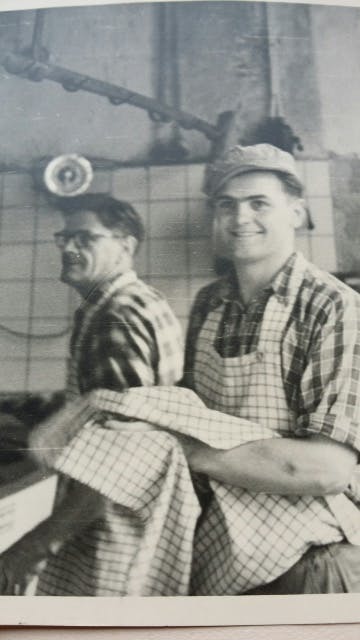
DV: Were you always planning to be in the meat business?
KK: I went to high school, graduated, and was going to be a doctor. Then, a coach from the soccer club came to my father and he signed me up for a professional club. I was eighteen, and so, I never did go back to school. I played a year and a half for Bayer Aspirin Company. Then I tore my Achilles tendon, and then I came back home. I married my wife, and they didn’t like her, so I couldn’t take over the Kuby’s. I always wanted to go to America anyways , so I went to America. I couldn’t go too easy. My father’s half brother, William Kuby, was living down in the valley and he sponsored me. He put up a $20,000 letter of credit so we could come here. Nobody could get into the United States unless you had a sponsor, and he was, somewhat, the black sheep of the family.
DV: Kind of like you were at that point?
KK: Yeah, that’s right.
DV: Who came with you?
KK: It was me, my wife, and my oldest boy. We came by boat. We came up the channel and got to Houston.
DV: What year was that?
KK: ’56. I worked for a company called Marr Meat Packing Company down in San Juan, Texas. They’re not there anymore, but they were a small packing house. They had about sixty-five people, so when I came over here they wanted a German sausage maker. I took over. They were making between two and three thousand pounds of sausage. When I left we were making 30,000 pounds three and a half years later. I ran it pretty tight.
DV: You told me the other day that you actually learned Spanish before you learned English?
KK: I had to learn Spanish, but you know I spoke French too.
DV: What was San Juan, Texas like then?
KK: It just had one drug store, one grocery store, and a hardware store. The hardware store had guns and everything. You could buy everything there. I bought my first shotgun for fourteen dollars there.
DV: You still have it?
KK: No. I gave it to one of the kids, maybe. Down in the Valley I was in the National Guard, and I had to do military service every year.
DV: Was that part of the deal of you emigrating here?
KK: No, no. I wanted to pay something back to this country. You’re making twenty-three dollars a month as a soldier, so we would get five dollars for training. I never had to go to basic training because I cooked too good. They put me right away in the kitchen.
DV: Did you cook or eat any barbecue down there?
KK: My cousin had a farm about 1600 acres. The first Christmas I was down there, he called me and he said, “I’m bringing about eight steers.” I worked for a packing house. He said, “I’ll come over there and cut them up with you.” We took the shoulders and the ribs. All they kept were the steaks, T-bones, the rump steaks, they kept that. The rest of it, we cut up in big pieces.
DV: Like the briskets?
KK: Yes. So about a week before Christmas, he had a trench dug about as long as this building, 100 ft. While they were digging that, they cleared up all the mesquite. They had two caterpillars about 50 feet apart, and they dragged a big chain, between the two of them and they pulled everything out of the ground.
DV: All the mesquite trees and everything?
KK: Yeah, yeah. And then the dried mesquite trees, they cut them up and put them in the trench. They burned them for three days until there was nothing but charcoal.
DV: What would you do with the meat?
KK: My cousin, made a solution. He cooked the peppers, and he made his own hot sauce and everything. Then he built a rack like this along the whole trench. He put the meat on there. Then here at the end he put the pepper sauce and all that stuff that he’d cooked. Then that evening before Christmas Eve he started putting that meat over those coals. And he put big sheets of metal over it. He had that big ole barrel there with water in it and little chips of mesquite. Every once in a while he took a big shovel of the wet, soaked stuff and threw it on the coals. It smoked all night long. The next day the farmers came from the whole valley, and we ate that whole thing! I mean, we started at 12 o’clock in the afternoon. They had beer and music and they ate that home-cooked stuff.
DV: It was all free?
KK: Yeah, they invited all their friends, the meat buyers, the vegetables buyers. I assume they paid for part of it. Everybody contributed.
DV: The big sauce pot at the end, was that the mop sauce?
KK: Yes. That’s right. That’s the best barbecue!
DV: Had you ever seen anything like that before?
KK: No. And the heads…at the end of the thing they dug holes, maybe about four feet deep and filled it up with two feet of hot coals. Then they put the meat, the beef heads, they put the sauce around it, onions in the mouth and hot peppers. They wrapped them in a burlap bag really wet and covered the coals with dirt. They put that head that was wrapped in burlap all wet and soaked in there. Then they filled it up with dirt. The next day, twenty-fours hours later, they opened that stuff up and it was the best stuff. The Mexicans, they liked that stuff better than the other barbecue.
DV: Yeah, barbacoa. It’s delicious. You’re making me hungry.
KK: The tongues and everything. We made that every year. That was the highlight.
DV: Did you ever try to replicate it?
KK: I can do it, but I just don’t have the place. If I had a ranch I would make it.
DV: You started in South Texas. At what point did you move to Dallas? Did you get a job up here?
KK: My wife didn’t like it down there too much. There was no Germans except for my cousins and maybe a couple of people. She had nobody – I worked 65, 70, sometimes 80 hours a week. I was in charge of their packing house. I would work from 6:00, come home and eat something and at 8:00 I had to go back there. You see the smokehouse, they were all hand-fired they were 3 stories high. It would be 8:30 before I came back. Then I watch a little television and I went to bed and she was the whole time alone. So one day a salesman came in, sold me the spices. And she says, “You know I have a friend of mine that wants to open up a German sausage company in Dallas.” I said, “Oh, tell him to call me.” The Fourth of July in 1959, he sent me a ticket with Trans Texas. I came up here and he showed me the place he had. The first guy I worked for was a crook. He put me in a bad position. A man who dealt with him, Mr. Nunam was a really down to earth individual. He said, “Karl, you shouldn’t be working for a guy like that.” He said, “I’ve got a locker plant. Why don’t you come up there and see if you can do something? I helped you get started.” I came up here.
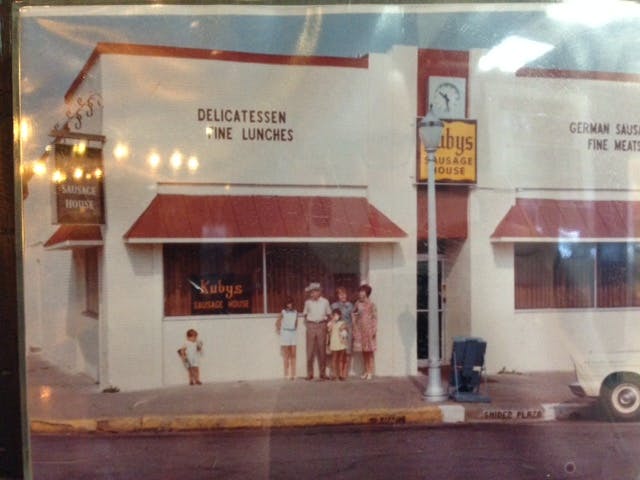
DV: And that was here, in this location?
KK: That was right here. We had 350 lockers. They had about four or five locker plants in Dallas.
DV: 350 lockers, what does that mean? What was the box?
KK: The box was about 28 inches wide, a foot deep, and about 3 feet deep. And it was a box, just an open box. You open it up, you put your meat in, you close it. You got your own key. They’d come in there, get their meat out.
DV: So when you say they would rent, you’re talking about customers would rent a box instead of having a freezer?
KK: Yeah. They had a refrigerator, but just a little freezer.
DV: It was like a post office for frozen meat?
KK: Yeah, yeah.
DV: You were making sausage along with butchering the rest of the frozen meat?
KK: And then I said, you know, how in the world do they know all about German sausage? So I went to my supplier and I bought a lot of meat from, Swift. I would go down there once a week and pick up all my meat. I’d put a tag on it and send that out. And the manager down there was a guy by the name of Garner.
DV: And you would be selecting half-carcasses?
KK: Yeah. I would buy five, six, heads of beef a week. Most of them we sold by the piece. I was down there when Garner said, “Let me take you somewhere.” So he took me to a place up in Oak Cliff, a Jewish delicatessen. And the guy’s name was Sternberg. He was a German Jew. We spoke together, and we sat there at the counter. We had corned beef, pastrami, and we had salami sandwiches. And he says, “The reason I took you over there, is because that’s what you need to do with your sausage.” He didn’t have tables in his place. He had a counter. Just like I have the counter right here. “Let the people taste what you have.”
DV: Sell something they can eat there.
KK: And then they all say, “Oh that’s good! I’ll take some home to my wife!” I said, “that’s not a bad idea.” I got a little stove in my sausage kitchen, and I had a tank there anyway to boil sausage. I made one soup a day for lunch. I put a counter in there. That counter in no time it was full. The first day we took in twenty-seven dollars that whole day. All of a sudden I had that restaurant. My gosh! We sold seventy-five dollars’ worth of lunch.
DV: All of your homemade sausages, you were selling them hot for lunch before you were ever selling them raw in the case?
KK: I sold them raw in the case too, but that was in desperation, because I didn’t sell any of them. People at that time, all they knew was weenies, salami, and bologna! It was all full of bologna! All of a sudden I had eight or nine cold cuts. I made my own corned beef. I made my own pastrami. I made everything myself. That way I could offer it to the public, and they liked it, and they took some home.
DV: Did you make your pastrami with navels?
KK: Yeah I used to make it with navels.
DV: The corned beef, was it brisket?
KK: Yeah, because I like mine fairly lean, but I take the fat and make pastrami. There’s no better cut for pastrami than the navel. You used to be able to buy those square-cut navels. You can’t buy them anymore.
DV: So how did you get from a tiny lunch counter that just you and your wife were running to having servers? At what point did the locker plant go away?
KK: Oh yeah, so about ‘65-‘66, they came in with freezers. I got rid of the lockers, and I put my sausage kitchen where the lockers were.
DV: So were you constantly adding to the sausages you were making?
KK: Yeah, I was making more and more sausage. First I had a smaller machine, then I had a hundred pound machine, then a two hundred pound machine.
DV: And they were all family recipes?
KK: Yeah, family recipes.
DV: Did you experiment at all based on new stuff that you tried in Texas?
KK: Yeah, I noticed right away that the family recipes from Europe, they were much too mild for American tastes.
DV: They needed more spice? More salt?
KK: Yeah, not so much more salt, but more spices. A little bit more. I put a little more garlic in the Polish than we did at home. I made two tastes. We had potato salad and two sausages. And then one day they came in and said, “Why don’t you make sauerkraut like in Germany?” There’s GIs coming from Europe. And I said, “Oh, I can make sauerkraut.” So I bought sauerkraut. Well they didn’t like it so much. Then somebody said, “Oh you could buy that from the Jewish delicatessen. They have sauerkraut. And I went to Saul over there and I said, “Now Ernie, over here we have a Kosher Deli.” And I said, “Where you buy your sauerkraut?” And he said, “Over at St. Luke’s they have fresh sauerkraut.” So I used to buy a 30 gallon barrel of sauerkraut.
DV: It was still fermenting?
KK: It was fermented. It was ready to go, when you opened the thing up, you’d smell. You know? Now we buy it in five gallon buckets. It’s fermented in barrels, and then I still have to wash it off. So then we had sauerkraut. Then they said, “Oh, I ate that red cabbage over there. It was so good. Why don’t you make red cabbage?” So I make red cabbage.
DV: Are these all things that you ate in Kaiserslautern?
KK: Yeah. That was basically what they eat over there. Then they want German potato salad and potato pancakes. You’ve got to go with the taste of the people. Let me tell you, I never had an idea about using German products. One day we were open maybe five months. A guy walked into the store and he says “You outta sell some German goods.” I said, “What do you have?” He brought a catalog from the table and I saw all the stuff I grew up with. So we bought from him.
DV: The stuff you grew up with, like what?
KK: You know, cookies and stuff, all the German goods. He had German pickles and German mustards.
DV: Do you still make the pastrami and the corned beef?
KK: Yeah, we make pastrami, corned beef.
DV: So what was your most popular sausage then? At the lunch counter?
KK: Wieners, Polish Sausage, Bratwurst.
DV: And what is it now?
KK: You know, my son comes in with the jalapeño chipotle and all that kind of stuff, and the Texans like that. And I like it too.
DV: So you do eat the jalapeño cheese and the chipotle?
KK: Oh yeah.
DV: What were your first thoughts when you heard the idea of jalapeño cheese sausage?
KK: My father was a very down to earth individual. He was probably a craftsmen. He said, “You have to go flow with the water. Don’t swim upstream.” So you’ve got to learn what the people like, and then you improve what they like. Or moderate that they like yours more than somebody else’s. You cannot make the best all the time, but once you have a winner, you stick to it and make it the same all the time that when they come, and these people come today, they want—You know you never change your potato salad ever. You never change your sauerkraut ever. Your soup is still tasting the same like day one. Which is true or not true. But we didn’t change it, more or less, you know sometimes.
DV: If you had a winner, you wouldn’t come up with a new recipe. You may tweak a few things here and there.
KK: That’s right, that’s right.
DV: Well your son told me something about jalapeño cheese sausage. He said you weren’t so kind about it when he introduced it.
KK: Exactly, I didn’t like it. I personally didn’t think it would sell, but he pushed it. I would have never done that, but I wasn’t working at the [sausage factory]. It was Karl and David [Norman]. They ran the [sausage factory] and I ran the restaurant with my daughter. We process a lot of deer too. We probably make 50,000 lbs of deer jerky.
DV: Now that’s like the way to get your deer processed anywhere in the country—is to get it made into salami or sausage or jerky.
KK: Yeah, I was the one that started that. I’m not kidding you. Maybe up in Wisconsin they cut it up like that.
DV: But around here no one was doing deer jerky when you were showing them?
KK: No!
DV: Did any of the Texas German sausages or Texas Czech sausages help inform any of your recipes, or is that anything you ever ate?
KK: Yeah, yeah. The Czechs, they make kielbasa. The craftsman that once existed didn’t do it anymore so they made the sausage to make a lot of money. Some of them put too much fat in it, it didn’t look right. That’s why I think the reason they made them so hot, so it didn’t matter. I have a philosophy. When you eat anything, you got to taste the meat. The meat is number one. And you should not taste one spice. It should be a blend.
DV: Down to Central Texas, you get these ring sausages, like at Kreuz Market. They’re beef with a little bit of pork and salt, pepper, and maybe some cayenne. What kind of sausage would that equate to in Germany?
KK: What they call a raw Polish.
DV: Raw polish?
KK: Yeah and there’s kinds like the polish sausage that is cooked over cold smoke. It’s slowly smoked and left hanged to dry.
DV: How does it feel to be in your position now where you were the black sheep of the family? You got shipped off to Texas and now you’re carrying on the family name as far as the butcher shop goes.
KK: I’m the only Kuby that still has a business. I’m kind of obligated to keep it going until it’s gone, because it’s still there. After all it started in 1723.
DV: I guess does it feel more special knowing that you kind of got kicked out of the family business and now you’re the only one carrying it on?
KK: Yeah. It’s a mental responsibility. You feel you’ve got to do it. My wife says, “Why don’t you sell it?” Because it’s always meant a lot of hours. Now I’ve got Karl and Dieter here, and David’s down at the warehouse. There was a time when I had a packing house, I would come in here at 4:00 in the morning and I would open up the store at 7:00. My manager here would come in and I would jump in the car and drive over to the packing plant that was called Kuby’s Sausage and open up the sausage place. I made the sausage until about 4:00 in the afternoon and then I came over here and closed this place up at 7:00. I lived in Richardson, so I came home around 7:30 or 8:00. Karl was a little baby. One Sunday morning we went off to church and he was not behaving. I said, “Come on over here with me.” He pushed me away and I said, “What in the world is the matter with that kid?” My wife said, “He doesn’t know you anymore!” You know? And I said, “Well this has to stop.” I had to change.
DV: Well it gave you more longevity right, cutting back your hours? You would’ve drained yourself out if you kept doing that.
KK: Probably would’ve. I don’t drink or smoke or anything like that. There’s more to life than just living.
DV: There’s more to life than work even it’s your middle name?
KK: Yeah. I have people that come over here and they say, “You’re still here, you’re still working.” I remember once a week we slept with my grandmother. My grandfather had died and my brother and I, we slept in the bed where my grandfather would lay next to my grandmother. She would tell us all kinds of stories from a long time ago. In the morning at 6:30 she would say, “Get up boys! Get out!” I would say, “Oh, I’m so tired.” She would say, “Get your ass out of bed. Remember that one thing – people die in bed!” I make sure that when I wake up I get out of bed.
- More About:
- Sausage


